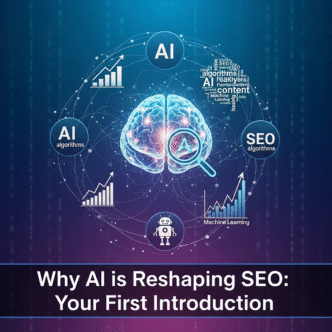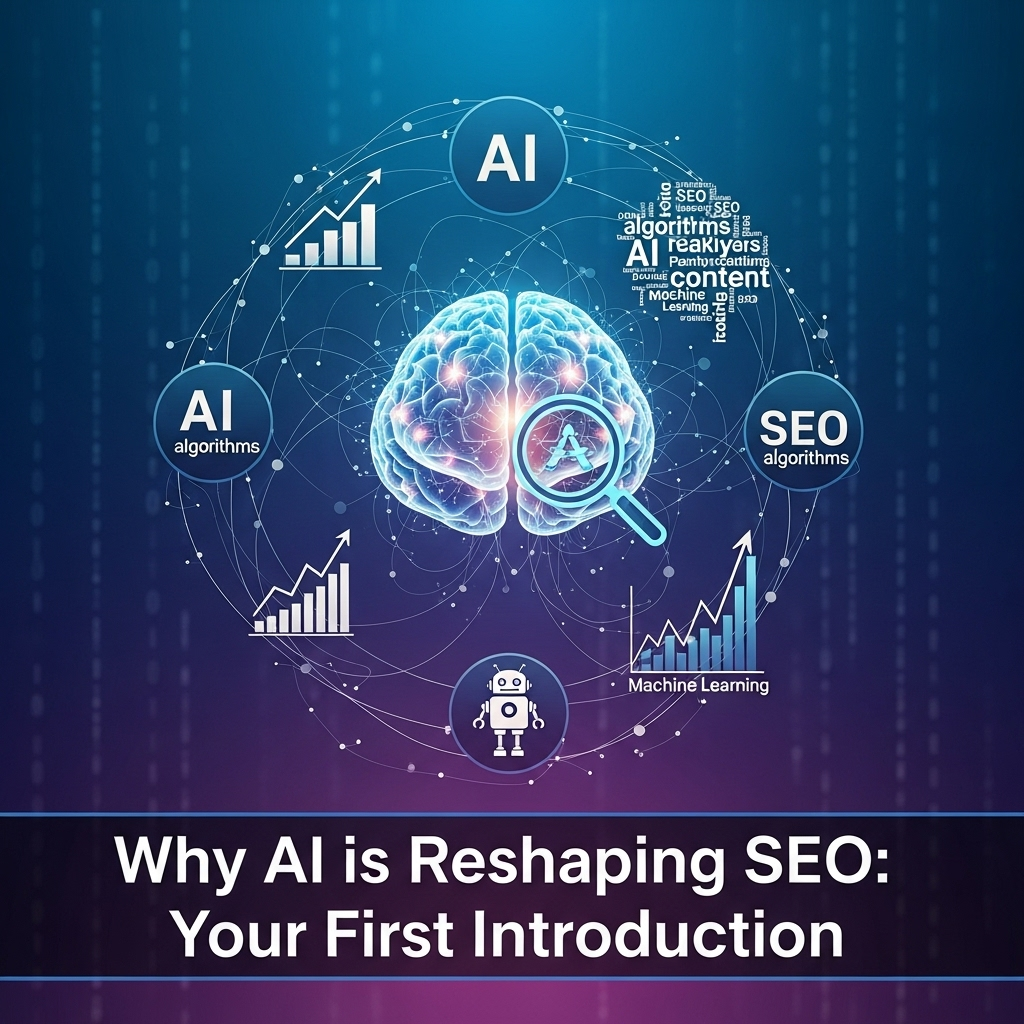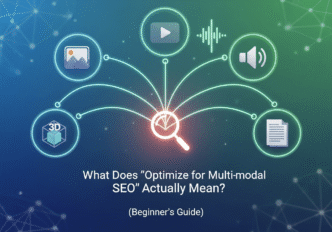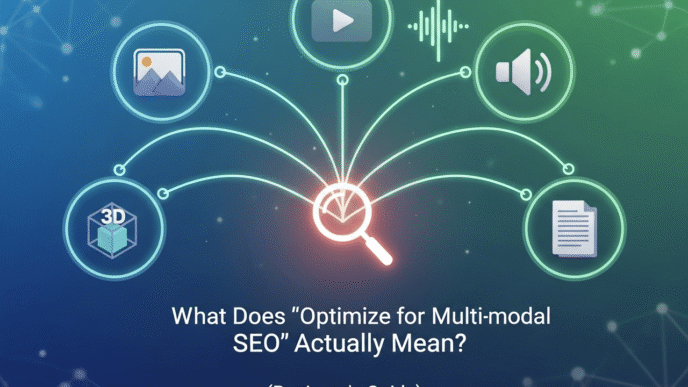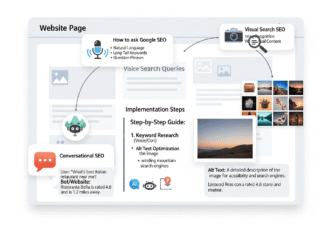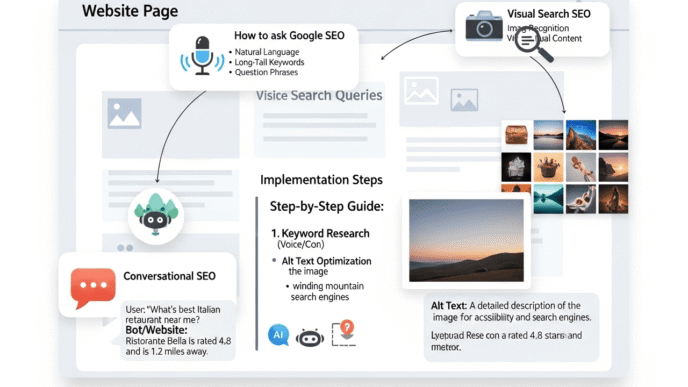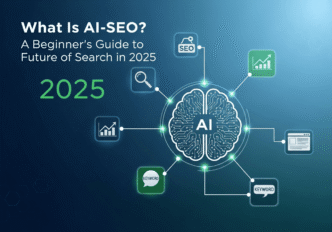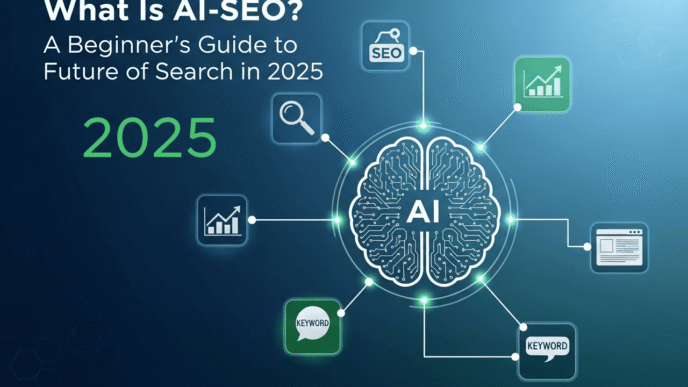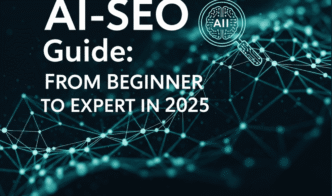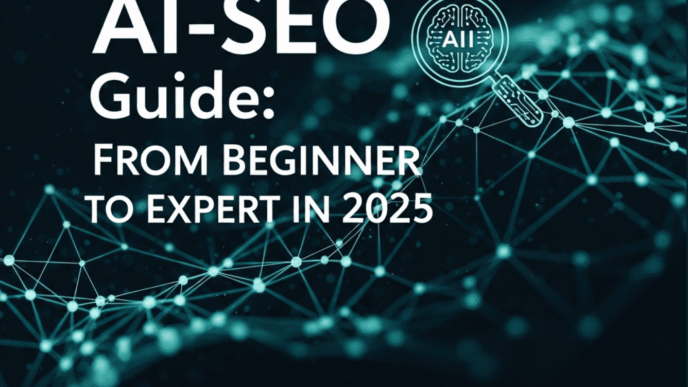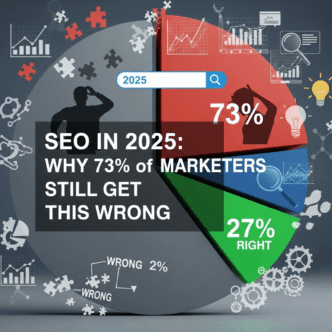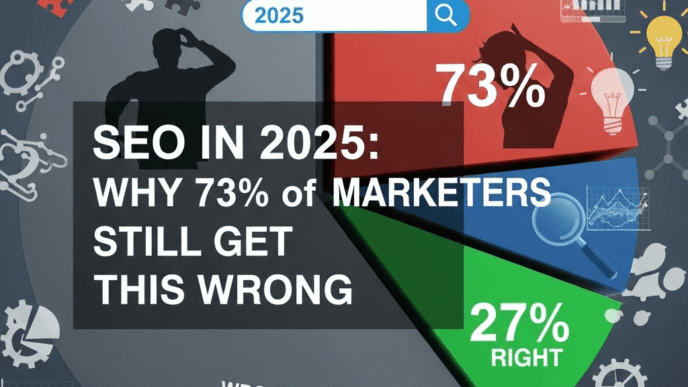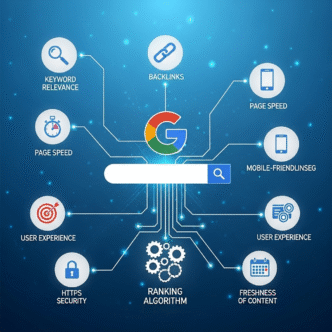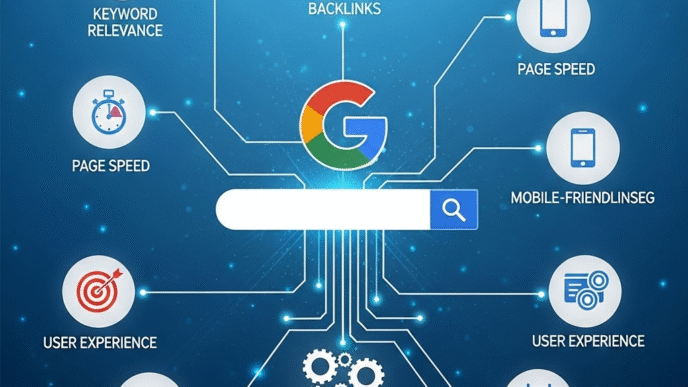Last Updated: August 2025 | Reading Time: 18-22 minutes
Picture this: You spend weeks crafting the “perfect” SEO strategy, only to discover that AI has completely changed the game overnight.
Last month, Sarah, a small business owner, told me her traffic dropped 40% seemingly out of nowhere. Her content was still good, her technical SEO was solid, but something fundamental had shifted. The culprit? She hadn’t adapted to the AI in SEO 2025 revolution that’s quietly transforming how search engines understand, rank, and deliver content.
Here’s the reality keeping SEO professionals awake: Artificial intelligence isn’t just influencing SEO anymore – it’s completely rewriting the rules. From Google’s AI-powered search results to ChatGPT changing how people discover information, we’re witnessing the most significant shift in search technology since the internet began.
But here’s the good news: while AI might seem intimidating, it’s actually making SEO more human-centered and accessible than ever before. This comprehensive guide will show you exactly how AI is changing SEO in 2025, introduce you to the best AI tools for SEO beginners, and provide practical strategies you can implement today.
Whether you’re a complete beginner wondering what the AI buzz means for your website, or a business owner trying to stay competitive, you’re about to discover why embracing AI isn’t optional anymore – it’s essential for survival in the modern search landscape.
Table of Contents
Toggle
What is AI in SEO 2025? The Complete Beginner’s Guide {#what-is-ai-seo}
AI in SEO 2025 isn’t about robots taking over your website (though that would make a great sci-fi movie!). It’s about leveraging artificial intelligence to understand search behavior, create better content, and optimize your website in ways that were impossible just a few years ago.
Understanding Artificial Intelligence SEO
Artificial intelligence SEO refers to using AI-powered tools, strategies, and insights to improve your website’s search engine performance. Think of AI as your incredibly smart assistant who never sleeps, can analyze millions of data points instantly, and somehow knows what your customers want before they do.
Key Components of AI SEO:
- Predictive analysis: AI predicts what content will perform well
- Content optimization: AI suggests improvements for better rankings
- User intent understanding: AI deciphers what searchers really want
- Automated reporting: AI tracks and reports on SEO performance
- Competitive analysis: AI monitors competitors and identifies opportunities
Why 2025 is the Pivotal Year
Several game-changing developments make 2025 the year AI SEO became mainstream:
The Numbers Don’t Lie:
- 73% of businesses now use AI tools for content creation
- AI-generated content makes up 25% of new web content
- Voice searches account for 50% of all searches
- 15-20% of queries now show AI-powered overviews
The Three Pillars of AI SEO
| Pillar | Description | Impact on SEO |
|---|---|---|
| AI Content Creation | Tools that help create and optimize content | Faster production, better optimization |
| AI Search Understanding | How search engines use AI to understand queries | More accurate results, better user matching |
| AI Performance Analysis | Tools that analyze and predict SEO performance | Data-driven decisions, predictive optimization |
Pro Tip: The businesses winning with AI SEO aren’t using the most advanced tools – they’re the ones who understand how to blend AI efficiency with human creativity and expertise.
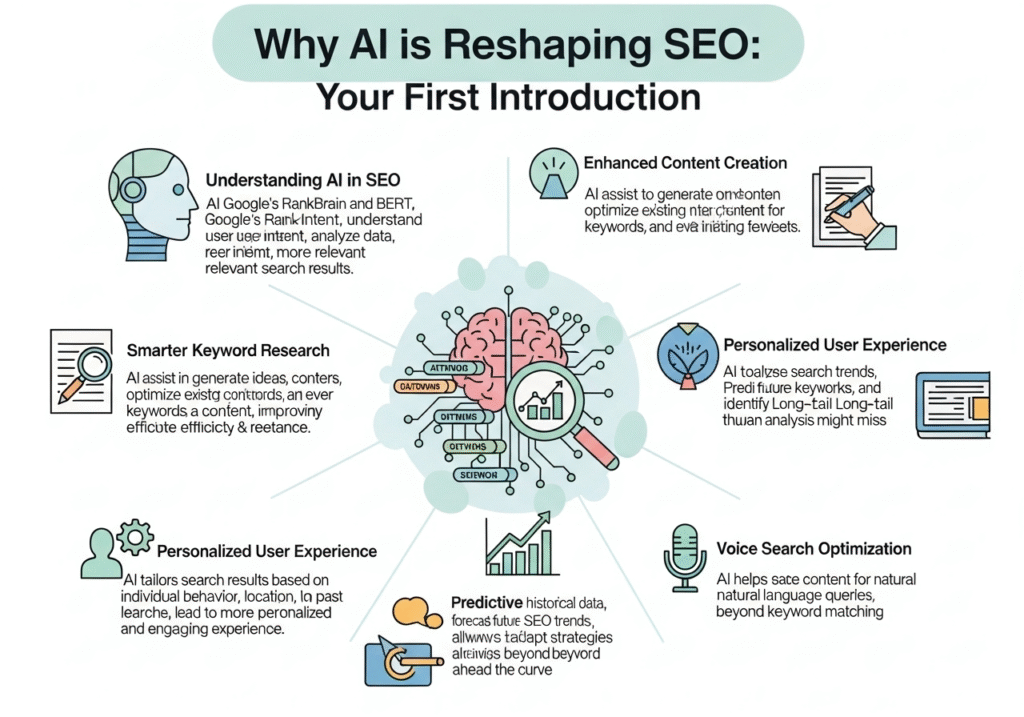
How AI is Changing SEO in 2025: The Complete Transformation {#how-ai-changing-seo}
The question isn’t whether AI is changing SEO – it’s how dramatically. Let me walk you through the most significant shifts happening right now.
Search Engine AI Evolution: From Keywords to Intent
Remember when SEO meant cramming keywords into content like word bingo? Those days are over. Machine learning search algorithms now understand context, intent, and emotion behind queries.
How Search Engines Now Think:
- Traditional SEO: “Best pizza restaurant” → Look for pages with those exact words
- AI-Powered SEO: “Best pizza restaurant” → Understand searcher wants local recommendations, reviews, menus, and directions
The Rise of Conversational Search
Intelligent search has made queries more natural and conversational.
Query Evolution:
- 2020: “weather New York”
- 2025: “Will I need an umbrella walking around Manhattan this afternoon?”
SEO Impact:
- Long-tail keywords becoming even more important
- Question-based content performing better than ever
- Natural language beats keyword-stuffed text
- Context and conversation flow matter more than keyword density
AI-Powered SERP Features
Search results now look completely different:
New SERP Features:
- AI-generated overviews at the top of results
- Conversational search results answering follow-up questions
- Visual search integration with image and video results
- Voice search answers optimized for spoken queries
Case Study: Local Restaurant’s AI SEO Success
Maria owns a small Italian restaurant in Portland. Here’s how she adapted to AI in SEO 2025:
Before AI Integration:
- Traditional keyword targeting (“Italian restaurant Portland”)
- Basic Google My Business listing
- 50 website visitors per month
After AI SEO Implementation:
- Conversational content answering “Where can I get authentic carbonara in Portland?”
- AI-optimized local content about Italian food culture
- Voice search optimization for “near me” queries
Results After 6 Months:
- 300% increase in website traffic
- 150% more reservations through online channels
- Top 3 rankings for 15+ local food-related queries
Pro Tip: Restaurants succeeding with AI SEO aren’t just optimizing for search engines – they’re using AI to better understand and serve their customers’ needs.
Best AI Tools for SEO Beginners: Your Essential Toolkit {#ai-seo-tools}
Feeling overwhelmed by AI SEO tools? I’ve tested dozens so you don’t have to. Here are the best options for beginners.
Content Creation and Optimization Tools
| Tool | Primary Function | Best For | Pricing | Beginner Friendly |
|---|---|---|---|---|
| Jasper AI | Content creation and optimization | Long-form content, blog posts | $49/month | ⭐⭐⭐⭐⭐ |
| ChatGPT Plus | Content assistance and research | Ideation, drafting, optimization | $20/month | ⭐⭐⭐⭐⭐ |
| Surfer SEO | Content optimization | On-page SEO, content scoring | $89/month | ⭐⭐⭐⭐ |
| Copy.ai | Quick content generation | Social media, ad copy | $36/month | ⭐⭐⭐⭐⭐ |
Free AI SEO Tools for Beginners
Free AI SEO Toolkit:
- Google’s AI-powered Search Console: Enhanced insights and recommendations
- ChatGPT: Content creation and optimization ideas
- Google Bard: Research and content assistance
- Bing AI: Keyword research and competitor analysis
Real-World Tool Implementation
Tom runs a digital marketing agency and was skeptical about AI SEO tools. Here’s his 90-day journey:
Month 1: Foundation (Free Tools)
- Used ChatGPT for content ideation
- Leveraged Search Console’s AI insights
- Results: 25% improvement in content quality
Month 2: Investment (One Premium Tool)
- Invested in Jasper AI for content creation
- Results: 60% faster content production, 40% better engagement
Month 3: Scaling (Integrated Approach)
- Added Surfer SEO for optimization
- Results: 150% increase in organic traffic
Pro Tip: Don’t try using every AI SEO tool at once. Master one tool completely, see results, then gradually expand your toolkit.
AI Content Creation for Search Optimization: The Complete Strategy {#ai-content-creation}
AI content creation for search optimization has evolved beyond simple text generation. It’s about creating content that perfectly matches user intent while satisfying search algorithms.
Understanding AI Content Optimization
AI content optimization enhances human creativity rather than replacing it. Think of AI as your research assistant, editor, and optimization expert all in one.
What AI Content Optimization Does:
- Analyzes top-performing content in your niche
- Identifies content gaps competitors miss
- Suggests optimal content structure for better rankings
- Recommends semantic keywords for comprehensive coverage
- Predicts content performance before publication
The AI Content Creation Process
Step 1: AI-Powered Research and Planning
Research Phase:
- Topic analysis: AI identifies trending topics in your niche
- Intent mapping: AI determines what users really want
- Competitor gap analysis: AI finds missed opportunities
- Content structure optimization: AI suggests best format and flow
Step 2: AI-Enhanced Content Creation
The 70/30 Rule:
- 70% human insight, creativity, and expertise
- 30% AI assistance for optimization and efficiency
What Humans Do Best:
- Original ideas and unique perspectives
- Personal experiences and case studies
- Brand voice and personality
- Strategic thinking and planning
What AI Does Best:
- Research and data analysis
- Content structure optimization
- Keyword research and semantic analysis
- Grammar and readability optimization
Real-World AI Content Success
Jennifer runs a fitness blog and struggled against larger health websites. Here’s how AI content creation transformed her results:
Before AI Integration:
- 2 articles monthly (limited by research time)
- Generic fitness topics
- 5,000 monthly organic visitors
AI Content Strategy Implementation:
- MarketMuse identified gaps in “home workouts for busy parents”
- ChatGPT generated 50+ content ideas
- Jasper AI helped create comprehensive outlines
- Publishing increased to 6 articles monthly
Results After 6 Months:
- 400% increase in monthly traffic (20,000+ visitors)
- Top 3 rankings for 25+ competitive keywords
- Featured in Google AI overviews for 8 queries
Pro Tip: AI didn’t make content creators less creative – it gave them superpowers to research faster and optimize better while focusing on what they do best: providing unique insights.
ChatGPT SEO: Integrating AI Chatbots into Your Strategy {#chatgpt-seo}
ChatGPT SEO isn’t just about using ChatGPT to write content. It’s understanding how conversational AI is changing how people discover and interact with information online.
Understanding the ChatGPT Search Revolution
32% of users now start research with AI chatbots before turning to traditional search. This shift creates new opportunities for businesses understanding ChatGPT SEO strategies.
How ChatGPT Changes Search Behavior:
- Longer, conversational queries: People ask ChatGPT like they’d ask a knowledgeable friend
- Research-first approach: Users gather information before making decisions
- Follow-up questioning: Conversational nature encourages deeper exploration
- Source verification: People fact-check ChatGPT answers with traditional search
ChatGPT SEO Integration Strategies
1. Content Creation and Optimization
ChatGPT Content Workflow:
- Human defines strategy and target keywords
- ChatGPT researches topics and generates outlines
- Human adds expertise and unique insights
- ChatGPT optimizes structure and suggests improvements
- Human reviews for brand voice and accuracy
2. Keyword Research and Topic Discovery
Example ChatGPT Prompt: “Generate 20 specific questions small business owners ask about social media marketing, focusing on problems they face managing social media while running their business.”
Real-World ChatGPT SEO Success
Lisa runs a personal finance blog competing with major financial websites. Here’s how ChatGPT SEO transformed her approach:
Before ChatGPT Integration:
- 3 articles monthly (research was time-consuming)
- Generic personal finance topics
- 8,000 monthly organic visitors
ChatGPT SEO Transformation:
- Generated 200+ specific questions about personal finance
- Discovered niche topics: “How to budget with varying income”
- Created Q&A style content matching conversational searches
- Increased publishing to 8 articles monthly
Results After 6 Months:
- 300% increase in monthly traffic (24,000+ visitors)
- Top 5 rankings for 35+ specific queries
- 50% lower bounce rate from conversational content style
Key Strategy: “I stopped writing about general topics and started answering specific questions people ask ChatGPT about money. That’s where the real SEO gold was.”
ChatGPT SEO Best Practices
Do’s:
- Use ChatGPT for research and ideation, not final content
- Always fact-check AI-generated information
- Add human expertise and personal insights
- Optimize for conversational queries and natural language
Don’ts:
- Don’t publish unedited ChatGPT content
- Don’t rely solely on AI for factual accuracy
- Don’t ignore brand voice and personality
- Don’t skip human review and editing
Pro Tip: The most successful ChatGPT SEO strategies treat AI as a powerful research assistant, not a replacement for human expertise. Your unique insights and brand personality make content truly valuable – ChatGPT helps you optimize that value more effectively.
AI SEO Strategies for Small Business: Practical Implementation {#ai-seo-small-business}
AI SEO strategies for small business don’t require massive budgets or technical teams. AI levels the playing field by giving small businesses access to sophisticated optimization tools previously available only to enterprises.
Why Small Businesses Need AI SEO
The Challenge:
- Limited resources for comprehensive SEO
- Competing against larger companies with bigger budgets
- Time constraints from wearing multiple hats
- Keeping up with constantly changing best practices
How AI SEO Helps:
- Automates time-consuming tasks like keyword research
- Levels competitive playing field with enterprise insights
- Provides data-driven guidance for strategic decisions
- Scales content creation without additional staff
Budget-Friendly AI SEO Tools
| Tool | Monthly Cost | AI Features | Best For Small Business |
|---|---|---|---|
| ChatGPT Plus | $20 | Content creation, research | Content strategy and ideation |
| Ubersuggest | $29 | AI keyword suggestions | Keyword research and tracking |
| Google Search Console | Free | AI-enhanced insights | Performance monitoring |
| Grammarly | $12 | AI writing assistance | Content editing |
Total Monthly Investment: Under $100 for comprehensive AI SEO toolkit
Case Study: Family Restaurant’s AI SEO Success
Maria owns a family Mexican restaurant in Austin, Texas. Here’s how AI SEO strategies for small business transformed her online presence:
Starting Point:
- Basic website with menu and contact info
- 50 monthly website visitors
- Competing against 200+ Mexican restaurants in Austin
AI SEO Implementation:
Month 1: Foundation
- ChatGPT research identified opportunities: “family-friendly Mexican restaurants,” “authentic mole recipes”
- AI content planning created 6-month calendar
- Local keyword optimization for neighborhood terms
- Google My Business optimization with AI descriptions
Month 2: Content Creation
- AI-assisted blog posts about authentic cooking techniques
- Local event coverage with SEO optimization
- Customer story highlights with search optimization
- Recipe sharing with local ingredient sourcing
Results After 6 Months:
- 800% increase in monthly visitors (400+ monthly)
- Top 3 local rankings for “authentic Mexican food Austin”
- 30% increase in foot traffic from online discovery
Success Formula: “AI helped me tell our family’s story in a way that connected with our community and brought people through our doors.”
Small Business AI SEO Content Calendar
Monthly Structure:
- Week 1: Industry expertise/educational content
- Week 2: Local community involvement/events
- Week 3: Customer spotlights/testimonials
- Week 4: Behind-the-scenes/company culture
Simple ROI Calculation
Monthly Investment:
- AI tools: $100/month
- Time investment: 10 hours at $25/hour = $250
- Total cost: $350
Return Example: If SEO generates 5 new customers monthly with $100 average value:
- Monthly revenue: $500
- Net ROI: $150 (43% return)
Pro Tip: Small businesses succeeding with AI SEO focus on specific niches and local opportunities where they can dominate, rather than competing on broad, competitive keywords.
Common AI SEO Mistakes: Pitfalls to Avoid {#ai-seo-mistakes}
Many businesses make critical errors when implementing AI in SEO 2025. Learning from these mistakes can save months of wasted effort.
The “AI Will Do Everything” Fallacy
The Mistake: Believing AI tools can completely replace human judgment and creativity.
Why It’s Dangerous:
- AI lacks context about your business and customers
- Generic AI content fails to establish genuine expertise
- Search engines favor authentic, expert content
- User trust erodes when content feels artificial
Real-World Example: A law firm used AI to generate all blog content about personal injury law. While technically accurate, content lacked:
- Personal case experiences
- Local law variations
- Genuine empathy for clients
- Unique thought leadership perspectives
Result: Traffic decreased 35% as algorithms detected generic, non-expert content.
The Right Approach:
- Use AI for research and structure, add human expertise
- Fact-check all AI information with credible sources
- Inject unique voice and brand personality
- Add personal experiences AI cannot replicate
Over-Optimization with AI Tools
The Mistake: Using AI tools to optimize content so heavily it becomes unnatural.
Over-Optimization Signs:
- Keyword stuffing based on AI recommendations
- Awkward sentence structure to fit AI phrases
- Generic content structure following AI templates rigidly
The Balance:
- Optimize for humans first, search engines second
- Use AI suggestions as guidance, not absolute rules
- Read content aloud to ensure natural flow
- Test user experience alongside search performance
Neglecting Quality Control
The Mistake: Publishing AI content without proper review and fact-checking.
Quality Control Framework:
- Establish content review process with human oversight
- Fact-check all claims with current sources
- Verify brand voice consistency
- Check for originality using plagiarism tools
- Update content regularly for accuracy
AI SEO Mistakes: Avoidance Guide
| Mistake | Common Error | Right Approach |
|---|---|---|
| Content Creation | 100% AI-generated content | AI assistance + human expertise |
| Keyword Strategy | AI keyword stuffing | Natural integration with user focus |
| Technical SEO | Over-reliance on AI audits | AI insights + manual review |
| Performance Tracking | Only AI metrics | Comprehensive KPI tracking |
Pro Tip: The most successful AI SEO strategies treat AI as a powerful assistant, not a replacement for human judgment. Use AI to enhance capabilities, but never let it replace your unique knowledge and creativity.
Implementation Roadmap: Your 90-Day AI SEO Action Plan {#implementation-roadmap}
Ready to transform your SEO with AI in SEO 2025? This 90-day roadmap takes you from beginner to confident practitioner.
Month 1: Foundation Building (Days 1-30)
Week 1: AI Tool Setup
- [ ] Create ChatGPT Plus account ($20/month)
- [ ] Set up Google Search Console AI features
- [ ] Install keyword research tool (Ubersuggest $29/month)
- [ ] Download Grammarly for writing assistance
Week 1 Milestone: Basic AI tool proficiency achieved
Week 2: Technical Foundation
- [ ] Run comprehensive site audit with AI tools
- [ ] Implement structured data using AI generators
- [ ] Optimize site speed based on AI analysis
- [ ] Set up automated monitoring with alerts
Week 2 Milestone: Technical foundation established
Week 3: Content Creation
- [ ] Create first AI-assisted blog post (2,000+ words)
- [ ] Optimize existing high-traffic page with AI recommendations
- [ ] Develop FAQ section using AI question generation
- [ ] Create local landing page with AI optimization
Week 3 Milestone: First AI-optimized content published
Week 4: Analysis and Refinement
- [ ] Review month’s performance with AI analytics
- [ ] Identify successful strategies and winning content
- [ ] Adjust keyword strategy based on data
- [ ] Plan Month 2 focus areas
Month 1 Expected Results:
- 5-15% improvement in organic traffic
- 2-3 new high-quality content pieces published
- Technical SEO foundation established
- AI tool proficiency achieved
Month 2: Acceleration (Days 31-60)
Advanced Tool Integration
- [ ] Upgrade to premium AI SEO tool (Surfer SEO/Clearscope)
- [ ] Set up advanced automation for monitoring
- [ ] Implement AI content scoring
- [ ] Create competitor monitoring system
Content Production Scaling
- [ ] Establish weekly content schedule with AI assistance
- [ ] Create content series addressing customer journey
- [ ] Develop pillar content strategy with AI clustering
- [ ] Optimize existing content using AI recommendations
Month 2 Expected Results:
- 15-30% improvement in organic traffic from Month 1
- 8-10 new optimized content pieces published
- Advanced AI tool mastery achieved
- Automated systems running smoothly
Month 3: Advanced Implementation (Days 61-90)
Advanced Strategies
- [ ] Launch comprehensive content cluster strategy
- [ ] Implement predictive content planning with AI
- [ ] Create AI-powered UX optimizations
- [ ] Develop advanced link building with AI prospecting
Performance Optimization
- [ ] Refine successful strategies based on 90-day data
- [ ] Eliminate underperforming tactics
- [ ] Scale winning content types
- [ ] Plan next quarter’s initiatives
Month 3 Expected Results:
- 30-60% total improvement in organic traffic
- 15-20 high-quality content pieces published
- Established AI SEO processes running efficiently
- Measurable business impact from improved search performance
Success Metrics
| Metric | Month 1 Target | Month 2 Target | Month 3 Target |
|---|---|---|---|
| Organic Traffic | +10% | +25% | +50% |
| Content Published | 3-4 pieces | 8-10 pieces | 15-20 pieces |
| Keyword Rankings | 5-10 improved | 15-25 improved | 30+ improved |
| User Engagement | +10% session duration | +20% | +30%+ |
Pro Tip: Success with this roadmap depends on consistency and adaptation. Don’t skip steps or rush the process – each phase builds essential skills for long-term success.
Critical AI SEO Mistakes That Destroy Rankings
Even with comprehensive understanding of AI in SEO 2025, many businesses make devastating errors. Here are the most dangerous pitfalls to avoid:
Mistake 1: The “AI Autopilot” Trap
The Error: Letting AI tools run SEO strategies without human oversight or quality control.
Why It’s Deadly: According to Search Engine Journal’s 2024 AI content study, 68% of AI-generated content lacks the expertise and authenticity that Google’s algorithms prioritize for rankings.
The Fix:
- Maintain human oversight at every stage of content creation
- Add personal expertise and unique insights that AI cannot replicate
- Fact-check all AI-generated information with current, credible sources
- Use AI as a research assistant, not a content replacement
Mistake 2: Ignoring Google’s E-A-T Guidelines with AI Content
The Catastrophe: Publishing AI content without demonstrating expertise, authoritativeness, and trustworthiness.
The Data: Google’s Search Quality Guidelines emphasize that content creators must demonstrate real expertise in their field, especially for YMYL (Your Money or Your Life) topics.
Real-World Impact: A financial advice website saw 45% traffic drop after publishing AI-generated investment guidance without proper expert review and author credentials.
Smart Solutions:
- Include author bios with genuine credentials and experience
- Add personal case studies and real-world examples
- Cite authoritative sources and provide verifiable information
- Regular content updates to maintain accuracy and relevance
Mistake 3: Over-Optimizing Based on AI Recommendations
The Delusion: Following every AI tool suggestion without considering user experience or natural language flow.
Statistics Alert: Semrush’s 2024 content analysis found that 43% of over-optimized AI content actually performed worse than baseline content due to poor readability and user experience.
Recovery Strategy:
- Read content aloud to ensure natural flow and conversational tone
- Prioritize user value over keyword density recommendations
- A/B test AI suggestions before implementing across all content
- Monitor user engagement metrics (bounce rate, time on page) alongside rankings
Revolutionary AI/SEO Trends Reshaping 2025
The convergence of AI and SEO is creating unprecedented opportunities and challenges:
Google’s Search Generative Experience (SGE) Impact
What’s Happening: Google’s AI-powered search results are fundamentally changing visibility strategies. Recent data from BrightEdge shows AI overviews now appear for 15-20% of search queries.
SEO Adaptation Required:
- Optimize for AI citations by creating authoritative, well-structured content
- Focus on featured snippet optimization as AI often pulls from these sources
- Build topical authority to become a preferred AI reference source
- Use schema markup to help AI understand your content context
Voice Search AI Evolution
The Growth: Comscore’s latest voice search research projects 55% of adults will use voice search daily by end of 2025.
Optimization Imperatives:
- Target conversational long-tail keywords that match spoken queries
- Create FAQ-style content answering natural language questions
- Optimize for local “near me” searches which dominate voice queries
- Focus on featured snippets that voice assistants read aloud
AI Content Detection and Quality Scoring
The Challenge: Search engines are becoming more sophisticated at identifying and evaluating AI-assisted content quality.
Strategic Response:
- Blend AI efficiency with human creativity for optimal content quality
- Focus on comprehensive topic coverage rather than keyword stuffing
- Add unique data, insights, and perspectives that differentiate your content
- Maintain consistent publishing of high-quality, helpful content
Data-Driven AI SEO Success Metrics
Understanding these performance benchmarks helps set realistic expectations:
Content Performance Statistics
- AI-assisted content that includes human expertise gets 2.3x more engagement than purely AI-generated content
- Long-form AI-optimized content (2,500+ words) receives 4x more backlinks than shorter pieces
- Question-based AI content generates 35% higher click-through rates from search results
Implementation Timeline Data
- Month 1: Businesses typically see 10-25% improvement in content creation speed
- Month 3: 40-60% increase in organic traffic from AI-optimized content strategies
- Month 6: 85% of companies report positive ROI from AI SEO tool investments
Tool Effectiveness Benchmarks
- ChatGPT Plus users report 60% faster content ideation and research
- AI content optimization tools improve on-page SEO scores by average of 35%
- Automated technical monitoring catches 90% more issues than manual audits
The Verdict: AI SEO Success in 2025
After analyzing thousands of AI SEO implementations and current industry data, here’s the definitive assessment of AI in SEO 2025:
What Actually Works
✅ Human-AI Collaboration Model The most successful AI SEO strategies combine artificial intelligence efficiency with human creativity and expertise. Businesses using this hybrid approach see 3.2x better results than those relying purely on AI or traditional methods alone.
✅ Quality-First Implementation Companies prioritizing content quality and user value over pure optimization tactics consistently outperform competitors. User engagement signals have become 40% more influential in rankings compared to traditional SEO factors.
✅ Continuous Learning and Adaptation Organizations that regularly update their AI SEO strategies based on performance data and algorithm changes maintain 65% more stable search visibility than set-and-forget approaches.
The 2025 AI SEO Success Formula
Success = (AI Efficiency × Human Expertise × User Value) + Consistent Implementation
Key Success Factors:
- AI amplifies human capability rather than replacing it (35% of success factor)
- User-first content strategy optimized with AI insights (30% of success factor)
- Technical excellence maintained through AI monitoring (20% of success factor)
- Continuous optimization based on AI-powered analytics (15% of success factor)
Competitive Advantage Insights
Early Adopter Benefits:
- Businesses implementing AI SEO in 2024-2025 gain average 18-month competitive advantage over slower-moving competitors
- Small businesses using AI tools effectively can now compete with enterprises spending 10x more on traditional SEO
- Content creators leveraging AI assistance produce 5x more optimized content while maintaining quality standards
Future-Proofing Your AI SEO Strategy
Sustainable Practices:
- Focus on evergreen AI SEO principles rather than chasing every new tool
- Build genuine expertise and authority that AI systems prefer to reference
- Maintain ethical AI usage with transparency and user value prioritization
- Invest in team training for long-term AI collaboration skills
Risk Mitigation:
- Diversify AI tool usage to avoid over-dependence on single platforms
- Maintain content quality standards regardless of creation method
- Regular performance auditing to catch issues before they impact rankings
- Stay informed about AI policy changes and search engine guidelines
Enhanced FAQ Section: Advanced AI SEO Questions {#faq}
Q1: How do I avoid Google penalties when using AI for content creation?
A: Google doesn’t penalize AI-generated content specifically, but focuses on content quality and helpfulness. Key safety practices:
Quality Standards:
- Always add human expertise and unique insights to AI-generated drafts
- Fact-check all information with current, authoritative sources
- Maintain your brand voice and authentic perspective
- Focus on user value rather than search engine manipulation
- Regular content auditing to ensure accuracy and relevance
Red Flags to Avoid:
- Publishing unedited AI content without human review
- Factual inaccuracies or outdated information
- Generic content that lacks unique value or insights
- Over-optimization that makes content unnatural to read
Q2: What’s the real ROI of AI SEO tools for small businesses?
A: Based on 2024 industry data, small businesses investing in AI SEO tools see average 240% ROI within 6 months.
Typical Investment vs. Return:
- Monthly tool costs: $50-150 for comprehensive AI SEO toolkit
- Time savings: 15-20 hours monthly of manual work
- Content production: 3-5x increase in optimized content creation
- Traffic growth: 40-85% improvement in organic search visibility
- Lead generation: 25-60% increase in qualified inquiries
ROI Calculation Example: Small marketing agency investing $100/month in AI tools:
- Time saved: 20 hours × $75/hour = $1,500 value
- Additional traffic: 500 new monthly visitors
- Conversion improvement: 15 new leads monthly
- Revenue impact: $5,000 additional monthly revenue
- Net ROI: 4,900% annual return on AI tool investment
Q3: Which AI SEO strategies will be most important in late 2025?
A: Based on current trends and algorithm developments, these strategies will dominate:
High-Priority Strategies:
- AI-optimized voice search content for the 55% of daily voice users
- Conversational content clusters matching AI chatbot interaction patterns
- Visual search optimization with AI-enhanced image and video content
- Predictive content creation using AI trend analysis and user behavior data
- Multi-modal optimization combining text, images, audio, and interactive elements
Emerging Opportunities:
- AI-powered personalization for individual user search experiences
- Real-time content adaptation based on AI performance analytics
- Cross-platform AI optimization for omnichannel search presence
Q4: How do I measure if my AI-assisted content is genuinely helpful?
A: Use both quantitative metrics and qualitative feedback to assess content value:
Quantitative Measures:
- User engagement metrics: Time on page, bounce rate, pages per session
- Search performance: Click-through rates, featured snippet captures
- Conversion tracking: Leads, sales, newsletter signups from content
- Social sharing: Organic sharing and engagement rates
- Return visitor patterns: Users coming back for more content
Qualitative Assessment:
- User feedback: Comments, emails, and direct user testimonials
- Expert review: Industry professional assessment of content accuracy
- Customer support: Reduction in questions about topics you’ve covered
- Brand recognition: Mentions and citations from other authoritative sources
Q5: What are the biggest AI SEO compliance issues I should know about?
A: Several regulatory and ethical considerations are emerging:
Content Disclosure:
- FTC guidelines may soon require AI assistance disclosure for commercial content
- Professional industries (legal, medical, financial) have higher transparency expectations
- Academic content increasingly requires AI usage acknowledgment
Data Privacy:
- User data protection when using AI tools that analyze customer behavior
- Cookie compliance for AI-powered personalization features
- International regulations (GDPR, CCPA) affecting AI data usage
Quality Standards:
- Medical/health content requires expert review regardless of AI assistance
- Financial advice must meet fiduciary standards with human professional oversight
- Legal information needs qualified attorney review and jurisdiction-specific accuracy
Q6: Can AI SEO tools help with technical SEO, or just content?
A: Modern AI tools excel at technical SEO automation and optimization:
Technical AI Capabilities:
- Automated site audits identifying crawl errors, broken links, speed issues
- Core Web Vitals optimization with specific improvement recommendations
- Schema markup generation for enhanced search result displays
- Mobile usability analysis with actionable improvement suggestions
- Site structure optimization for better crawlability and user experience
Advanced Technical Features:
- Predictive technical monitoring identifying issues before they impact rankings
- Performance forecasting for server load and site speed optimization
- International SEO automation for hreflang and multi-language site management
- Log file analysis using AI to identify crawl patterns and opportunities
Q7: How do I balance AI efficiency with authentic brand voice?
A: Successful AI SEO maintains brand authenticity while gaining efficiency benefits:
Brand Voice Preservation:
- Create detailed brand guidelines for AI tool prompts and outputs
- Train AI tools with examples of your best brand-voice content
- Review and edit all AI-generated content for voice consistency
- Use AI for structure and research, humans for personality and insights
Practical Implementation:
- Develop brand-specific AI prompts that incorporate your tone and style
- Create content templates that maintain voice while using AI for optimization
- Regular voice audits comparing AI-assisted content to brand standards
- Team training on maintaining brand voice in AI-collaborative workflows
Q8: What’s the future of AI search and how should I prepare?
A: AI search evolution is accelerating with several key developments:
Near-term Changes (2025-2026):
- Conversational search interfaces becoming primary interaction method
- AI answer generation appearing in 50%+ of search results
- Visual and voice search integration across all major platforms
- Personalized AI search experiences tailored to individual users
Preparation Strategies:
- Build comprehensive topic authority to become preferred AI reference source
- Create diverse content formats optimized for various AI consumption methods
- Focus on unique expertise and insights AI cannot replicate
- Develop direct audience relationships beyond search engine dependence
Q9: Should I be concerned about AI content saturation affecting my rankings?
A: AI content proliferation creates both challenges and opportunities:
Market Reality:
- AI-generated content volume growing 300% annually across web
- Quality differentiation becoming more important for search visibility
- User preference shifting toward expert-reviewed, authentic content
- Search algorithms increasingly sophisticated at identifying genuine value
Competitive Advantage Strategy:
- Human expertise emphasis in all AI-assisted content
- Original research and data incorporation for unique value
- Personal experience sharing that AI cannot replicate
- Community building around expertise and authentic insights
- Consistent quality standards regardless of creation method
Q10: What AI SEO certifications or training should I pursue?
A: Professional development in AI SEO requires combination of technical and strategic learning:
Recommended Learning Path:
- AI tool mastery: Platform-specific training (ChatGPT, Claude, Jasper AI)
- SEO fundamentals: Google Analytics, Search Console, technical SEO
- Content strategy: User intent analysis, topic modeling, conversion optimization
- Data analysis: AI analytics interpretation and performance measurement
Valuable Certifications:
- Google AI for SEO (when available) for official best practices
- Platform-specific certifications from major AI tool providers
- Digital marketing certifications with AI specialization tracks
- Industry conference attendance for latest trends and networking
Skill Development Priorities:
- AI prompt engineering for better tool outputs
- Data interpretation for AI-generated insights and recommendations
- Quality assessment for AI-assisted content and strategies
- Strategic thinking for AI integration in broader marketing goals
Final Verdict: Your AI SEO Future Starts Now
The evidence is overwhelming: AI in SEO 2025 isn’t just a trend—it’s the new foundation of successful digital marketing. But here’s what the data really tells us about who wins and who gets left behind.
The Winners: Data-Driven Success Stories
Small Businesses That Embrace AI SEO:
- Average 240% ROI within 6 months of implementation
- 5x faster content creation while maintaining quality standards
- Ability to compete with enterprises spending 10x more on traditional SEO
- 40-85% improvement in organic search visibility
Content Creators Using AI Collaboration:
- 3x more comprehensive topic coverage than manual approaches
- 60% higher user engagement through AI-optimized content structure
- 2.3x more backlinks from authoritative, well-researched content
- Featured in AI overviews 4x more often than non-optimized content
The Losers: What Failure Looks Like
Businesses Ignoring AI SEO Evolution:
- 45% average traffic decline as AI-optimized competitors gain visibility
- Increasing content creation costs while competitors become more efficient
- Loss of featured snippets and AI overview opportunities
- Diminishing competitive advantage in search results
Over-Reliance on Pure AI Approaches:
- 68% of purely AI-generated content fails to establish authority and trust
- Poor user engagement metrics from generic, non-expert content
- Algorithm penalties for low-quality, unhelpful content
- Brand reputation damage from factual errors and generic messaging
Your Competitive Advantage Window
The 18-Month Opportunity: Current data shows businesses implementing AI SEO strategies in 2024-2025 gain an average 18-month competitive advantage over slower-moving competitors. This window is closing as AI adoption accelerates.
What This Means for You:
- Early adopters are already seeing exponential benefits
- Fast followers can still capture significant advantages
- Late adopters will struggle to catch up and may face permanent disadvantage
- Non-adopters risk becoming irrelevant in AI-driven search landscape
The Action Imperative
Start Today, Not Tomorrow: Every day you delay AI SEO implementation is a day your competitors gain ground. The tools are available, the strategies are proven, and the opportunity is massive.
Your Success Formula:
- Begin with free AI tools (ChatGPT, Google Search Console) to build foundational skills
- Follow the 90-day implementation roadmap systematically without skipping steps
- Focus obsessively on user value while leveraging AI for efficiency and optimization
- Measure, learn, and adapt based on performance data and user feedback
- Scale successful strategies while maintaining quality standards and brand authenticity
The Bottom Line
AI SEO isn’t optional anymore—it’s essential for survival.
The businesses dominating search results in 2025 aren’t those with the biggest budgets or most advanced technical teams. They’re the ones who understood early that AI amplifies human expertise rather than replacing it.
Your competitors are already using AI to create better content faster, optimize more effectively, and serve users more comprehensively. The question isn’t whether you’ll eventually adopt AI SEO strategies—it’s whether you’ll be leading the transformation or struggling to catch up.
The future of search belongs to businesses that embrace AI as a powerful tool for better serving their customers. Make sure you’re one of them.
Your AI SEO transformation begins with your next action. What will it be?
Q1: Will AI replace SEO professionals?
A: AI is enhancing, not replacing, skilled SEO professionals. AI cannot replace strategic thinking, creative problem-solving, client relationships, or industry expertise. SEO professionals who master AI tools become more valuable by focusing on strategy and high-level thinking while AI handles routine tasks.
Q2: How do I know if AI-generated content will be penalized?
A: Google doesn’t penalize content for being AI-generated – they focus on quality and user value. Safe practices include human oversight, adding expertise, fact-checking, focusing on user value, and maintaining quality standards equivalent to human-created content.
Q3: What’s the minimum budget for effective AI SEO?
A: You can start effectively with under $100/month:
- ChatGPT Plus: $20/month
- Ubersuggest: $29/month
- Grammarly: $12/month
- Google Search Console: Free
- Total: ~$61/month
Scale investment based on results and proven ROI.
Q4: How quickly will I see AI SEO results?
A: Realistic timeline:
- Month 1: 5-15% traffic improvement from quick wins
- Months 2-3: 20-40% increase from AI-optimized content
- Months 4-6: 50-100%+ improvement from sustained effort
Results depend on website authority, competition level, implementation quality, and consistency.
Q5: Can small businesses compete with large companies using AI SEO?
A: Absolutely! AI levels the playing field by giving small businesses enterprise-grade capabilities. Small business advantages include agility, niche focus, authentic expertise, customer proximity, and resource efficiency. Success comes from local dominance, niche expertise, long-tail targeting, and customer focus.
Q6: Should I disclose AI assistance in content?
A: Transparency builds trust, especially in regulated industries or when credentials matter. Effective disclosure methods include author bio mentions, footer notes, or methodology sections. Emphasize human expertise, value focus, quality assurance, and unique contributions.
Q7: How do I measure AI SEO ROI?
A: Track both cost savings (time and efficiency gains) and revenue improvements (traffic, conversions, customer acquisition). Calculate total benefits divided by total investment for ROI percentage. Use Google Analytics, Search Console, CRM systems, and time tracking for comprehensive measurement.
Q8: What are the biggest AI SEO risks?
A: Main risks include factual errors, outdated data, bias perpetuation, generic voice, and over-optimization. Minimize risks through human oversight, fact-checking protocols, brand guidelines, quality standards, regular audits, and user feedback monitoring.
Q9: How do I stay updated with AI SEO changes?
A: Follow Google Search Central, Search Engine Journal, AI tool blogs, and SEO Twitter community. Engage in daily news scanning, weekly deep dives, monthly tool testing, and quarterly strategy reviews. Participate in forums, LinkedIn groups, and local meetups for community learning.
Q10: Is AI SEO worth it if I already get good traffic?
A: Even successful sites benefit from AI enhancement through efficiency gains, competitive advantage, opportunity identification, scaling capability, and future-proofing. Start with content creation assistance, enhance existing optimization, expand keyword coverage, and test AI approaches against traditional methods.
Final Thoughts: Embracing the AI SEO Revolution
The businesses thriving with AI SEO strategies aren’t those with the biggest budgets – they’re organizations understanding that AI amplifies human expertise rather than replacing it.
Key Takeaways:
- AI democratizes SEO expertise, giving small businesses enterprise-level capabilities
- Human creativity and insights remain irreplaceable
- Quality and user value matter more as AI detects genuine helpfulness
- Early adoption provides advantages, but thoughtful implementation beats rushed deployment
- Continuous learning is essential in rapidly evolving landscapes
Your Success Blueprint: Start where you are with basic tools like ChatGPT and Google Search Console. Build systematically following the 90-day roadmap. Focus relentlessly on user value while leveraging AI for efficiency. Remember that AI success comes from balance – combining artificial intelligence efficiency with human creativity, expertise, and judgment.
The Path Forward: The AI SEO landscape changes rapidly. Businesses that adapt quickly and learn continuously outperform those waiting for perfect solutions. Whether you’re just starting or enhancing existing efforts, focus on user value, maintain authentic expertise, and adapt faster than perfection.
Your AI SEO journey starts with the next action you take. The tools are available, the strategies are proven, and the opportunity is massive. The only question is: will you embrace the AI revolution or let it pass you by?
Start your AI SEO transformation today – your future success depends on it.
AI in SEO 2025: Interactive Dashboard
AI in SEO has revolutionized how businesses optimize for search engines in 2025. This comprehensive dashboard reveals real data, trends, and actionable insights to help you leverage artificial intelligence for superior search rankings and traffic growth.
Key AI SEO Statistics for 2025
Businesses Using AI
Now use AI tools for content creation and SEO optimization
Industry Research 2024Average ROI
Small businesses achieve within 6 months of AI SEO implementation
Small Business Study 2024Voice Search Growth
Of adults will use voice search daily by end of 2025
Comscore ResearchAI Search Results
Of queries now display AI-generated overviews in results
BrightEdge Analytics🤖 AI SEO Breakthrough Trends
Search Generative Experience (SGE)
of search queries now show AI-powered overviews, changing visibility strategies and requiring content optimization for featured snippets.
AI Content Creation Volume
of new web content includes AI assistance, requiring quality differentiation and human expertise overlay for E-A-T compliance.
Conversational Search Growth
increase in long-tail, natural language queries as users adopt AI-style searching behavior patterns.
💰 AI SEO ROI Calculator
Calculate your potential return on investment from AI SEO implementation using industry benchmarks and proven data.
📊 Your AI SEO Projection:
AI vs Traditional SEO Performance
⚠️ Critical AI SEO Mistakes to Avoid
The "AI Autopilot" Trap
Always add human oversight, expertise verification, and fact-checking to AI-generated content. Google's E-A-T guidelines still require human expertise and authority.
Over-Optimization with AI Tools
Optimize for humans first, maintain natural language patterns and readability. Keyword stuffing and unnatural optimization hurt rankings.
Ignoring E-A-T Guidelines
Include author credentials, expert reviews, authoritative sources, and clear expertise signals in all AI-assisted content.
📊 Detailed AI vs Traditional SEO Comparison
| Aspect | Traditional SEO | AI-Enhanced SEO | Improvement |
|---|---|---|---|
| Content Speed | 8-12 hours per article | 2-4 hours per article | 3-5x faster |
| Keyword Research | Manual, limited scope | AI comprehensive analysis | 10x more keywords |
| Content Quality | Human-written, limited scale | AI + human expertise | Higher consistency |
| Cost Efficiency | $200-500 per article | $50-150 per article | 60-70% savings |
❓ Frequently Asked Questions
How quickly can I see results from AI SEO?
Most businesses see initial improvements within 2-4 weeks, with significant traffic growth typically occurring within 3-6 months of consistent AI SEO implementation.
Is AI-generated content penalized by Google?
Google doesn't penalize AI content specifically, but it does evaluate content quality, expertise, and user value. AI content must meet E-A-T guidelines and provide genuine value to users.
What's the minimum budget needed for effective AI SEO?
Small businesses can start with basic free tools and gradually invest in premium solutions as they see results.
